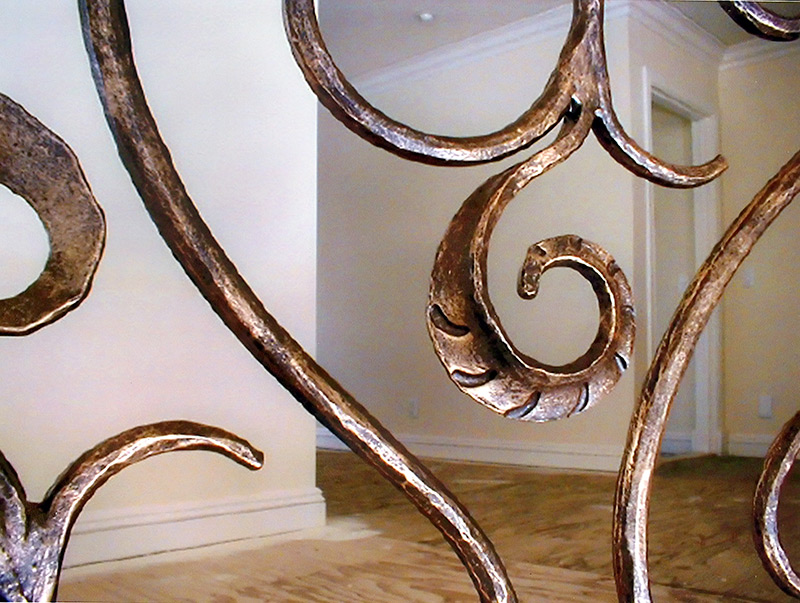Our Work
 Kipu Forge provides a wide range of custom metal work to architects, contractors, homeowners, craftsmen and galleries. The forge produces mostly one of a kind hand forged gates, railings and home furnishings along with many tools for blacksmiths and farriers.
Kipu Forge provides a wide range of custom metal work to architects, contractors, homeowners, craftsmen and galleries. The forge produces mostly one of a kind hand forged gates, railings and home furnishings along with many tools for blacksmiths and farriers.
“Most people think of a blacksmith as a farrier (one who shoes horses), but they are completely different,” says Ted Shanks, owner of Kipu Forge. Shanks does both, and calls blacksmithing the “king of trades.” Kipu Forge is busy filling orders for railings and wrought-iron gates, and a request to design a prototype for commercial cooking utensils. We make our own line of specialty tools such as hammers, tongs, punches and chisels, under the brand Kipu Forge. Ted also offers lectures, blacksmithing demonstrations and cowboy poetry at conventions, and teaches visiting blacksmiths from around the world. And yes, once in a while we shoe a horse.
About Us
 Ted Shanks has been blacksmithing in Hawaii for three decades — first on Maui and, since 1987, on Kauai. His first large-scale architectural job was to create an award-winning 187-foot interior railing for a luxury home on Oahu which drew attention to blacksmithing in Hawaii. His award-winning designs are now found in homes, businesses and workshops across Hawaii and beyond.
Ted Shanks has been blacksmithing in Hawaii for three decades — first on Maui and, since 1987, on Kauai. His first large-scale architectural job was to create an award-winning 187-foot interior railing for a luxury home on Oahu which drew attention to blacksmithing in Hawaii. His award-winning designs are now found in homes, businesses and workshops across Hawaii and beyond.
Ted joined with Michael Unverzagt and Antone Teves to start the company. Both Mike and Antone served apprenticeships in blacksmithing before joining Kipu Forge.
Ted is originally from East Tennessee and was taught by the well-known metal sculptor Ellison Torbert. Shanks is a traditionally trained blacksmith, having apprenticed under English and Scottish masters. Ted Shanks is a member of the Artist-Blacksmiths’ Association of North America (ABANA) as well as a Certified Journeyman Farrier and Tester for the American Farriers Association and a member of the Anvil 21 Club.
Our Tools
 The tools at Kipu Forge differ little from those of a thousand years ago. Working in our Lihue shop, we burn coal, coke and propane gas to heat steel, bronze and copper, which is pounded, bent and fashioned into architectural elements, utensils, tools and implements, large and small.
The tools at Kipu Forge differ little from those of a thousand years ago. Working in our Lihue shop, we burn coal, coke and propane gas to heat steel, bronze and copper, which is pounded, bent and fashioned into architectural elements, utensils, tools and implements, large and small.
“Blacksmiths traditionally had to know not only everyone else’s tools, but also how to make their own, too,” says Ted. “A blacksmith is his own most important tool. A man ought to be able to make his own tools and rely on himself.”
